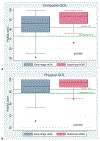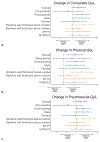Quality of Life and Exercise Capacity in Early Stage and Subclinical Hypertrophic Cardiomyopathy: A Secondary Analysis of the VANISH Trial
- PMID: 39087355
- PMCID: PMC11335449
- DOI: 10.1161/CIRCHEARTFAILURE.124.011663
Quality of Life and Exercise Capacity in Early Stage and Subclinical Hypertrophic Cardiomyopathy: A Secondary Analysis of the VANISH Trial
Abstract
Background: The health-related quality of life (HRQOL) and cardiopulmonary exercise testing (CPET) performance of individuals with subclinical and early stage hypertrophic cardiomyopathy (HCM) have not been systematically studied. Improved understanding will inform the natural history of HCM and factors influencing well-being.
Methods: VANISH trial (Valsartan for Attenuating Disease Evolution in Early Sarcomeric HCM) participants with early stage sarcomeric HCM (primary analysis cohort) and subclinical HCM (sarcomere variant without left ventricular hypertrophy comprising the exploratory cohort) who completed baseline and year 2 HRQOL assessment via the pediatric quality of life inventory and CPET were studied. Metrics correlating with baseline HRQOL and CPET performance were identified. The impact of valsartan treatment on these measures was analyzed in the early stage cohort.
Results: Two hundred participants were included: 166 with early stage HCM (mean age, 23±10 years; 40% female; 97% White; and 92% New York Heart Association class I) and 34 subclinical sarcomere variant carriers (mean age, 16±5 years; 50% female; and 100% White). Baseline HRQOL was good in both cohorts, although slightly better in subclinical HCM (composite pediatric quality of life score 84.6±10.6 versus 90.2±9.8; P=0.005). Both cohorts demonstrated mildly reduced functional status (mean percent predicted peak oxygen uptake 73±16 versus 78±12 mL/kg per minute; P=0.18). Percent predicted peak oxygen uptake and peak oxygen pulse correlated with HRQOL. Valsartan improved physical HRQOL in early stage HCM (adjusted mean change in pediatric quality of life score +4.1 versus placebo; P=0.01) but did not significantly impact CPET performance.
Conclusions: Functional capacity can be impaired in young, healthy people with early stage HCM, despite New York Heart Association class I status and good HRQOL. Peak oxygen uptake was similarly decreased in subclinical HCM despite normal left ventricular wall thickness and excellent HRQOL. Valsartan improved physical pediatric quality of life scores but did not significantly impact CPET performance. Further studies are needed for validation and to understand how to improve patient experience.
Registration: URL: https://www.clinicaltrials.gov; Unique identifier: NCT01912534.
Keywords: cardiomyopathy, hypertrophic; exercise test; functional status; psychological well-being; quality of life.
Conflict of interest statement
Dr Day is involved in consulting for Lexicon Pharmaceuticals; is on the Data Monitoring Committee of Cytokinetics; and receives funding from Lexicon Pharmaceuticals and Bristol Myers Squibb. Dr Canter is a consultant for Bristol Myers Squibb and receives research support from Tenaya, Merck, and Novartis (none relevant). Dr Bach receives research support (institutional only) from MyoKardia, Bristol Myers Squibb, and Cytokinetics, outside of the submitted work. Dr Wheeler receives research support and in-kind support from MyoKardia Inc, a wholly owned subsidiary of Bristol Myers Squibb, and research support from Cytokinetics Inc and Novartis Inc, all outside of the submitted work. Dr Rossano is a consultant for AskBio, American Regent, Bayer, BioMarin, Bristol Myers Squibb, Enzyvant, and Merck. Dr Owens has been consulting for Bristol Myers Squibb, Cytokinetics, Pfizer, Tenaya, BioMarin, Lexicon, Lexeo, Edgewise, and Stealth Therapeutics and receives research support from Bristol Myers Squibb. Dr Mestroni receives research funding from Bristol Myers Squibb, Tenaya Therapeutics, Pfizer, BioMarin, Greenstone Bioscience, and Spark Therapeutics. Dr Taylor receives research funding from Bristol Myers Squibb, Tenaya Therapeutics, Rocket Pharmaceuticals, BioMarin, and Spark Therapeutics. Dr Patel receives a research grant from GE Healthcare. Dr Soslow is involved in unrelated consulting for Sarepta, Pfizer, Immunoforge, and WCG Imaging. Dr Claggett is involved in statistical consulting for Alnylam, Cardurion, Corvia, CVRx, Cytokinetics, Intellia, and Rocket. Dr Ho is a consultant for and receives research funding from Bristol Myers Squib, Pfizer, Cytokinetics, Tenaya, BioMarin, viz.AI, and Lexicon (none relevant). The other authors report no conflicts.
Figures



Comment in
-
New Perspectives on Early Stage Hypertrophic Cardiomyopathy: Measuring What Matters.Circ Heart Fail. 2024 Aug;17(8):e012093. doi: 10.1161/CIRCHEARTFAILURE.124.012093. Epub 2024 Aug 1. Circ Heart Fail. 2024. PMID: 39087345 No abstract available.
References
-
- Anker SD, Agewall S, Borggrefe M, Calvert M, Caro JJ, Cowie MR, Ford I, Paty JA, Riley JP, Swedberg K, et al. The importance of patient-reported outcomes: a call for their comprehensive integration in cardiovascular clinical trials. Eur Heart J. 2014;35:2001–2009. - PubMed
-
- Green CP, Porter CB, Bresnahan DR, Spertus JA. Development and evaluation of the Kansas City Cardiomyopathy Questionnaire: a new health status measure for heart failure. J Am Coll Cardiol. 2000;35:1245–1255. - PubMed
-
- Varni JW, Seid M, Kurtin PS. PedsQL™ 4.0: Reliability and Validity of the Pediatric Quality of Life Inventory™ Version 4.0 Generic Core Scales in Healthy and Patient Populations. Med Care. 2001;39:800–812. - PubMed
-
- Varni JW, Limbers CA. The PedsQL™ 4.0 Generic Core Scales Young Adult Version. J Health Psychol. 2009;14:611–622. - PubMed
Publication types
MeSH terms
Substances
Associated data
Grants and funding
LinkOut - more resources
Full Text Sources
Medical

